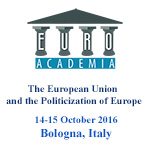Euroacademia Conferences
 Europe Inside-Out: Europe and Europeanness Exposed to Plural Observers (9th Edition) April 24 - 25, 2020
Europe Inside-Out: Europe and Europeanness Exposed to Plural Observers (9th Edition) April 24 - 25, 2020 Identities and Identifications: Politicized Uses of Collective Identities (9th Edition) June 12 - 13, 2020
Identities and Identifications: Politicized Uses of Collective Identities (9th Edition) June 12 - 13, 2020 8th Forum of Critical Studies: Asking Big Questions Again January 24 - 25, 2020
8th Forum of Critical Studies: Asking Big Questions Again January 24 - 25, 2020 Re-Inventing Eastern Europe (7th Edition) December 13 - 14, 2019
Re-Inventing Eastern Europe (7th Edition) December 13 - 14, 2019 The European Union and the Politicization of Europe (8th Edition) October 25 - 26, 2019
The European Union and the Politicization of Europe (8th Edition) October 25 - 26, 2019 Identities and Identifications: Politicized Uses of Collective Identities (8th Edition) June 28 - 29, 2019
Identities and Identifications: Politicized Uses of Collective Identities (8th Edition) June 28 - 29, 2019 The European Union and the Politicization of Europe (7th Edition) January 25 - 26, 2019
The European Union and the Politicization of Europe (7th Edition) January 25 - 26, 2019 7th Forum of Critical Studies: Asking Big Questions Again November 23 - 24, 2018
7th Forum of Critical Studies: Asking Big Questions Again November 23 - 24, 2018 Europe Inside-Out: Europe and Europeanness Exposed to Plural Observers (8th Edition) September 28 - 30, 2018
Europe Inside-Out: Europe and Europeanness Exposed to Plural Observers (8th Edition) September 28 - 30, 2018 Identities and Identifications: Politicized Uses of Collective Identities (7th Edition) June 14 - 15, 2018
Identities and Identifications: Politicized Uses of Collective Identities (7th Edition) June 14 - 15, 2018
How do Israeli Government Officials Perceive the EU Neighborhood Policy? Implications to Normative Power Europe
-
-

-
Presentation speakers
- Lia Moran-Gilad, Dep. of Politics and Government, Ben-Gurion University of the Negev, Israel
- Download presentation
Abstract:
The ‘Normative Power Europe’ (NPE) theory suggests that the EU’s power is in its ability to define what is “normal” or “appropriate” in international relations. NPE relies on EU core norms and is said to be transferred to other actors through various diffusion modalities. In 2004 the EU has launched the European Neighborhood Policy (ENP), aimed at building relationships based on ‘mutual values’ with Eastern and Southern neighbors. The EU is constantly building capacity as a part of the ENP, spanning fields such as economy, trade, transport, legislation, environment and health. Institutionalization of the EU relations with its neighboring countries may thus be considered a form of normative power. Despite a growing body of knowledge pertaining to NPE theory and its relevance to the ENP, the perceptions and attitudes towards norm diffusion among government officials within beneficiary countries have not been extensively studied. Taking Israel as a case-study, a semi-structured interview approach was used to study the perceptions and attitudes of senior technical officers and decision-makers in four Ministries of the Israeli government. This paper will examine NPE from a new angle by exploring whether capacity building is a new form of diffusion of NPE that has not been previously identified and characterized. Specifically, this study seeks to analyze the relation between capacity building in European neighborhood and NPE and contribute to the theoretical discourse spanning NPE by assessing if capacity building is indeed a modality of normative diffusion.
-
Related Presentations

Scale Economies in European Trade
- Laura Bonacorsi













